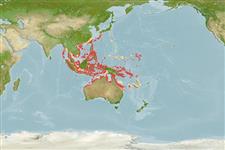Teleostei (teleosts) >
Ovalentaria/misc (Various families in series Ovalentaria) >
Pomacentridae (Damselfishes) > Pomacentrinae
Etymology: Neoglyphidodon: Greek, para = the side of + Greek, glyphis = carved + Greek, odous = teeth.
More on author: Cuvier.
Environment: milieu / climate zone / depth range / distribution range
Ecology
Marine; reef-associated; non-migratory; depth range 2 - 23 m (Ref. 7247). Tropical; 32°N - 25°S, 92°E - 171°E
Indo-West Pacific: Andaman Sea (Phuket), Malayan Archipelago, Indonesia, Philippines, Taiwan, Ryukyu Islands, Palau, New Guinea, Solomon Islands, Vanuatu, and northern Australia. Previously referred to as Paraglyphidodon behnii by Allen (see Ref. 4966).
Size / Weight / Age
Maturity: Lm ? range ? - ? cm
Max length : 13.0 cm TL male/unsexed; (Ref. 48636)
Two forms: long-tailed and black as adults occur in the Andaman Sea, ranging east to western Bali and north to Japan. Second form, probably valid as N. xanthurus occur in the rest of the West Pacific and the two overlap in range on Bali's north coast (Ref. 48636). Occur in coral-rich areas of lagoon and seaward reefs. Usually solitary (Ref. 1602). Feed on algae, crustaceans, and pelagic tunicates and salps. Oviparous, distinct pairing during breeding (Ref. 205). Eggs are demersal and adhere to the substrate (Ref. 205). Males guard and aerate the eggs (Ref. 205). Diurnal species (Ref. 54980; 113699).
Life cycle and mating behavior
Maturity | Reproduction | Spawning | Eggs | Fecundity | Larvae
Oviparous, distinct pairing during breeding (Ref. 205). Eggs are demersal and adhere to the substrate (Ref. 205). Males guard and aerate the eggs (Ref. 205).
Allen, G.R., 1991. Damselfishes of the world. Mergus Publishers, Melle, Germany. 271 p. (Ref. 7247)
IUCN Red List Status (Ref. 130435: Version 2024-1)
Threat to humans
Harmless
Human uses
Fisheries: commercial; aquarium: public aquariums
Tools
Special reports
Download XML
Internet sources
Estimates based on models
Preferred temperature (Ref.
123201): 25.2 - 29.3, mean 28.6 °C (based on 2042 cells).
Phylogenetic diversity index (Ref.
82804): PD
50 = 0.5020 [Uniqueness, from 0.5 = low to 2.0 = high].
Bayesian length-weight: a=0.01905 (0.01139 - 0.03187), b=2.99 (2.84 - 3.14), in cm total length, based on LWR estimates for this species & (Sub)family-body (Ref.
93245).
Trophic level (Ref.
69278): 3.0 ±0.32 se; based on food items.
Resilience (Ref.
120179): High, minimum population doubling time less than 15 months (Preliminary K or Fecundity.).
Fishing Vulnerability (Ref.
59153): Low vulnerability (10 of 100).
Nutrients (Ref.
124155): Calcium = 97.9 [49.9, 152.2] mg/100g; Iron = 0.711 [0.434, 1.149] mg/100g; Protein = 18.4 [17.2, 19.4] %; Omega3 = 0.113 [0.069, 0.180] g/100g; Selenium = 23.1 [13.3, 42.1] μg/100g; VitaminA = 87.8 [25.9, 280.8] μg/100g; Zinc = 1.57 [1.08, 2.24] mg/100g (wet weight);
